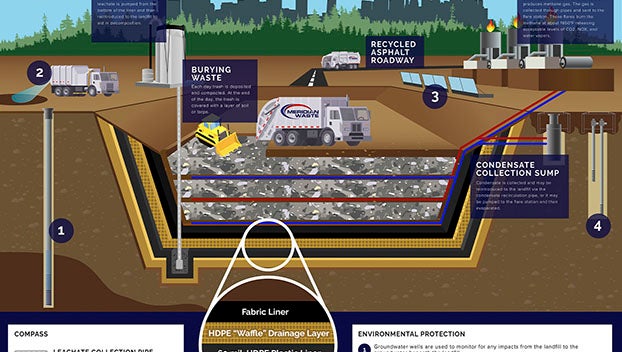Lunenburg landfill turns trash into clean energy
Published 8:45 am Thursday, February 16, 2023

- A graphic provided by Merdian Waste shows the process of turning landfill gas into clean energy.
|
Getting your Trinity Audio player ready...
|
Meridian Waste, the company responsible for the Lunenburg Landfill, has invested in a multi-million-dollar capital expense project to convert landfill gas to an energy collection and conversion system.
The project began in July and is expected to be completed in the fall.
According to Chief Marketing Office with Meridian Waste, Mary O’Brien, the clean energy project pulls gas from most of the landfill cells on the entire site.
“The constructed landfill is approximately 54 acres,” O’Brien said. “Of the 54 acres, the system extracts gas from approximately 40 acres.”
O’Brien said the remaining 14 acres do not have enough height for a gas well, but gas will be extracted from those acres as soon as suitable heights are in place for safe well installation, which could be within the next two years.
How does Lunenburg landfill process work?
it in a flare or is diverted to an on-site facility for the conversion of this gas to energy, thus, preventing it from escaping into the atmosphere as a greenhouse gas.
The treated landfill gas can be pumped off-site to a manufacturer or commercial business near the landfill to supplement or replace their natural gas usage in the form of Renewable Natural Gas (RNG).
It can also be used to generate electricity at the landfill, then delivered to the electrical grid to power homes and businesses.
“This is why the conversion of landfill gas to energy is an effective means of recycling and reusing this valuable resource,” O’Brien said.
Where does the clean energy go?
The RNG is injected into a pipeline at the facility, which ultimately is sold to firms that have committed to a low or zero-emission energy supply.
These firms are located across the United States and vary from manufacturers to colleges to other tech firms.
Currently, the Lunenburg Landfill has a closed area and six permitted, lined disposal cells.
O’Brien said the closed area has been closed per VA DEQ requirements, and gas is actively being extracted from that area.
“At the start of 2023, four lined disposal cells have been constructed, and in the next year, the remaining two permitted cells will be constructed,” she added.
How does this benefit Lunenburg County?
Traditionally, methane gas – which is a natural product of decomposition – would have been burned off onsite in a flare as allowed by a Virginia DEQ permit. O’Brien said that however, by making this investment in the gas collection system and turning it into RNG to be used to power communities and businesses, a byproduct of the landfill will now be converted into energy.
“It will prevent the gas from entering the atmosphere as a greenhouse gas, meaning cleaner air for everyone,” she said. “RNG is an ultra-low carbon transportation fuel and renewable energy resource that can be used to power or fuel anything that runs on natural gas. This means the garbage accepted at the Lunenburg Landfill will soon be used as a transportation fuel, electricity generation, and/or to heat homes and businesses.”
According to O’Brien, gasses are created when organic waste breaks down or decomposes within a landfill.
Modern landfills have landfill gas collection systems to collect this landfill gas, which contains approximately 50% methane and is either destroyed by combusting


